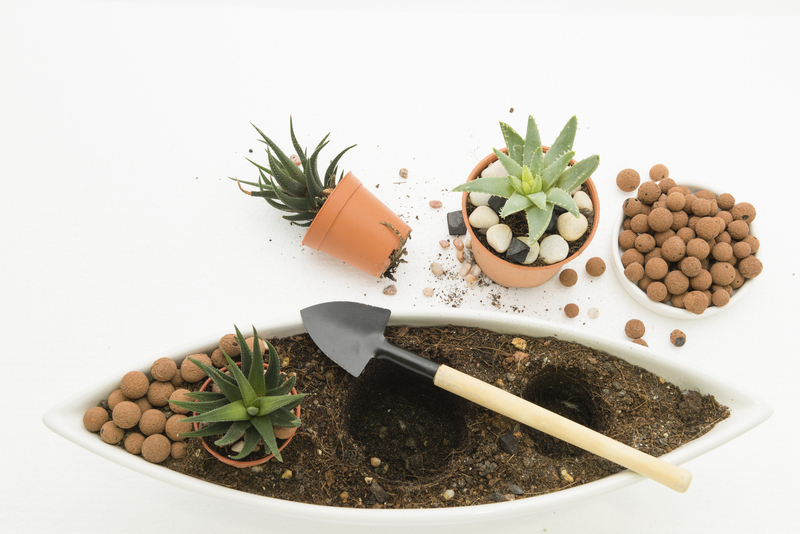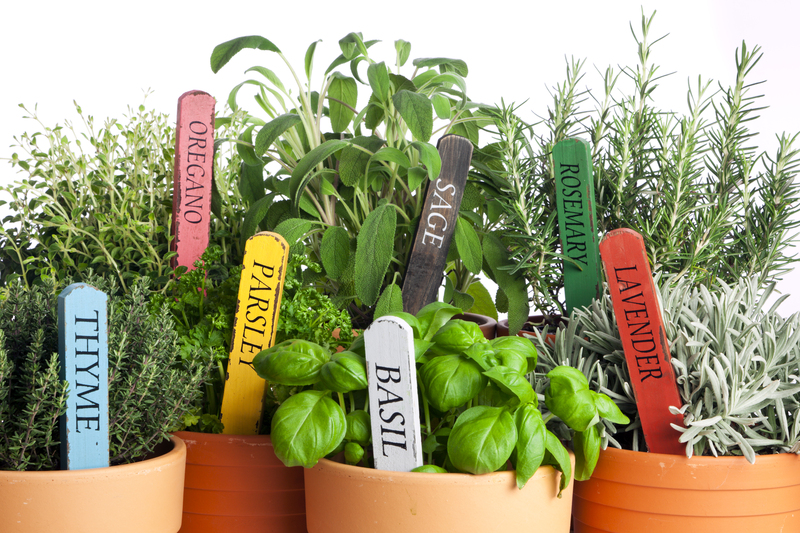Cultivating Life: Breathing New Life into Soil with Organic Waste
Posted on 13/06/2025
Cultivating Life: Breathing New Life into Soil with Organic Waste
Soil is often seen as little more than "dirt" -- a passive background to our gardens, farms, and parks. In reality, soil is a living, breathing ecosystem that supports virtually all terrestrial life. At the heart of soil vitality is the practice of utilizing organic waste to rejuvenate and enhance its fertility. In this article, we will explore the transformative power of organic waste, discover practical ways to cultivate life in the soil, and share the science behind breathing new life into your garden, lawn, or fields.
What Is Organic Waste?
Organic waste refers to any biodegradable material derived from plant or animal sources. Common examples include:
- Fruit and vegetable peels
- Coffee grounds
- Eggshells
- Grass clippings and yard trimmings
- Manure from herbivorous animals
- Dead leaves and garden debris
- Food scraps and leftovers
Organic waste is rich in essential nutrients and provides a valuable resource for soil regeneration. When managed properly, it can be transformed into compost or other soil amendments that foster the growth of beneficial microorganisms and enhance the soil's structure and fertility.

The Importance of Healthy Soil
Healthy soil is the foundation of sustainable agriculture and flourishing gardens. It supports plant growth, improves water retention, and fuels the nutrient cycles fundamental to all terrestrial ecosystems. However, intensive farming, erosion, pollution, and overuse of chemical fertilizers can lead to soil degradation, stripping away nutrients and life from the earth.
By returning organic waste back to the earth, we can revitalize depleted soil, sequester atmospheric carbon, and promote a vibrant ecosystem teeming with life. This process is often described as closing the nutrient loop -- an essential step toward a regenerative and sustainable food system.
How Organic Waste Enriches Soil Life
Organic waste is the fuel that powers the soil food web. When added to soil in the right form and in appropriate quantities, organic matter:
- Feeds beneficial microorganisms: Fungi, bacteria, protozoa, and earthworms thrive on decomposing organic material.
- Improves soil structure: Organic matter helps soil particles aggregate, increasing porosity and water retention.
- Boosts nutrient availability: As microbes break down organic matter, they release essential nutrients like nitrogen, phosphorus, and potassium in plant-available forms.
- Enhances resilience: Healthy soils are better able to withstand drought, flood, pests, and diseases.
- Reduces landfill waste: Recycling organic waste keeps valuable materials out of landfills, lowering methane emissions.
Let's delve deeper into how composting organic waste breathes new life into the soil.
Composting: The Heart of Cultivating Life with Organic Matter
What Is Composting?
Composting is a controlled process where organic waste is broken down by microorganisms, transforming kitchen scraps and yard debris into a dark, crumbly soil amendment known as compost. This homemade "black gold" is packed with microbial life and plant-available nutrients.
Why Compost?
- Enriches soil fertility naturally
- Suppresses plant diseases and pests
- Reduces reliance on chemical fertilizers
- Lowers household and community waste
- Improves soil texture and water retention
How to Start Composting at Home
You don't need a large farm or fancy equipment to start composting organic waste. Here's how you can begin nurturing your own soil:
- Choose a composting method: Backyard bins, tumblers, piles, or vermicomposting (using worms)
- Gather compostables: Combine "greens" (nitrogen-rich materials like food scraps and grass clippings) and "browns" (carbon-rich materials like dry leaves and newspaper).
- Maintain the balance: Keep your pile moist but not soggy, and aerate regularly for optimal microbial activity.
- Wait and harvest: After a few months, your finished compost will smell earthy and look crumbly -- ready to add life to your soil.
*Tip: Avoid adding meat, dairy, oily foods, or diseased plants to home compost piles, as these can attract pests or foster harmful pathogens.*
Organic Waste Solutions for Urban and Rural Spaces
Composting in Small Spaces
City dwellers can breathe new life into urban soil -- even with limited space. Balcony composters, bokashi bins, and worm composting systems are compact options that turn kitchen scraps into valuable humus. Many cities now offer community composting programs for residents.
On the Farm: Large-Scale Organic Waste Management
Farms generate huge volumes of organic waste in the form of crop residues, animal manure, and pruning debris. Through managed composting and mulching, farmers can:
- Reduce input costs
- Suppress weeds naturally
- Enhance yields
- Reduce pollution
- Promote sustainable food production
The Science of Soil Regeneration: Microbes and More
When you add organic waste to the soil, you feed the tens of billions of microorganisms in a single handful of earth. These tiny engineers of the underground play roles such as:
- Breaking down complex organic compounds
- Cycling nutrients between plant roots and soil
- Supplying growth hormones to plants
- Competing with and suppressing plant pathogens
Mycorrhizal fungi, for example, form symbiotic partnerships with plant roots, helping them access water and minerals -- while receiving plant sugars in return. These partnerships are essential for soil health and plant vitality.
Organic Mulches: The Living Blanket for Soil
Besides compost, applying organic mulch (like straw, grass clippings, or wood chips) on the soil surface protects and nourishes the earth below. Mulches:
- Reduce water loss from evaporation
- Suppress weeds without chemicals
- Keep soil temperatures consistent
- Break down slowly, feeding soil organisms over time
With regular mulching and composting, your soil becomes a resilient, life-filled matrix.
Organic Waste and Soil Carbon Sequestration
An often-overlooked benefit of returning organic waste to the soil is carbon sequestration. When organic matter decomposes in healthy soil, much of its carbon is stored underground as stable humus. This locks atmospheric carbon dioxide beneath the surface, helping fight global climate change.
Increasing the carbon content of soil through continuous inputs of compost and mulch is a key principle of "carbon farming" -- a set of regenerative agricultural practices that draw carbon out of the air and store it in soils and plants.
Common Myths About Organic Waste and Soil Health
- Myth: Organic waste leads to pests and disease in soil.
Fact: When composted correctly, organic waste becomes a safe, biologically active soil amendment that suppresses many pathogens and pests. - Myth: Synthetic fertilizers are always better than compost.
Fact: Synthetic fertilizers often deliver short-term results at the cost of long-term soil depletion. Compost and organic matter build soil life and structure for lasting fertility. - Myth: All organic waste breaks down at the same rate.
Fact: Different materials decompose at different speeds. Woody materials take longer, while soft greens decompose quickly -- mixing both creates balanced compost.
Simple Steps to Start Breathing New Life into Your Soil
- Begin collecting household organic scraps in a countertop bin or container.
- Set up a compost pile or worm bin in your yard, basement, garage, or on the balcony.
- Mix in brown materials (dry leaves, straw, cardboard) with kitchen waste for balanced decomposition.
- Aerate your compost every week to provide oxygen for microbes and speed up breakdown.
- Apply finished compost and mulch to gardens, flower beds, and landscape plantings for visible improvements to soil and plants.
- Support community composting initiatives or farmers who regenerate soils with organic waste. Your choices have a ripple effect beyond your garden!
Case Studies: Cultivating Life with Organic Waste Worldwide
Urban Composting in New York City
NYC's residential composting program diverts thousands of tons of food scraps away from landfills each year, turning them into rich compost for parks and community gardens. This effort reduces greenhouse gas emissions and enriches soils that grow fresh produce for urban communities.
Smallholder Farmers in Kenya
By composting livestock manure and crop residues, families in Kenya have reversed soil erosion and boosted crop yields by 2-3 times -- increasing both food security and household income while restoring the health of their land.
Regenerative Vineyards in California
Leading wineries are using grape pomace and composted cover crops to add organic matter to depleted vineyard soils, revitalizing microbial life and reducing the reliance on external inputs.
Organic Waste: The Key to Soil's Future Vitality
The journey to cultivating life and breathing new life into your soil starts with recognizing the value of what we once considered "waste." Every banana peel, every pile of autumn leaves, and every scoop of coffee grounds is a potential source of regeneration and abundance.
By returning organic waste to the land, we're not just feeding our plants -- we're repairing the earth's vital systems, fighting climate change, and nurturing a resilient web of life for generations to come.

Frequently Asked Questions: Organic Waste for Soil Health
- Can I use cooked food scraps in my compost?
Most home compost systems do best with raw plant materials, but some cooked foods (without meat, dairy, or oil) can be composted with care. Bokashi fermentation is a safe way to pre-treat cooked foods before adding them to the compost pile. - Is composting smelly or dirty?
When managed properly, compost should smell earthy, not rotten or unpleasant. Aeration and balancing green and brown materials prevent odors. - How much compost should I apply?
For gardens, 1/2 to 1 inch of compost spread on top of the soil once or twice a year works wonders. Mix into the top few inches for best results. - Is organic waste good for lawns?
Yes! Mulched leaves and grass clippings make an excellent natural fertilizer for lawns, improving soil structure and feeding beneficial organisms.
Conclusion: Make Every Scrap Count
In a world challenged by soil degradation, wastefulness, and climate uncertainty, the ancient wisdom of recycling organic matter is proving more vital than ever. By making simple changes at home or supporting sustainable agriculture, we each hold the power to cultivate living soil and a thriving planet. Every time you compost kitchen scraps or choose products from farms that prioritize soil health, you are casting a vote for a healthy, abundant future -- one banana peel at a time.
Breathe new life into your soil with organic waste -- and grow a greener, richer world from the ground up.
Latest Posts
First Steps in Garden Revival: Your Makeover Guide
Five Expert Tips to Protect Your Garden from Extreme Weather
Creating a Wonder-Filled and Child-Accommodating Garden



